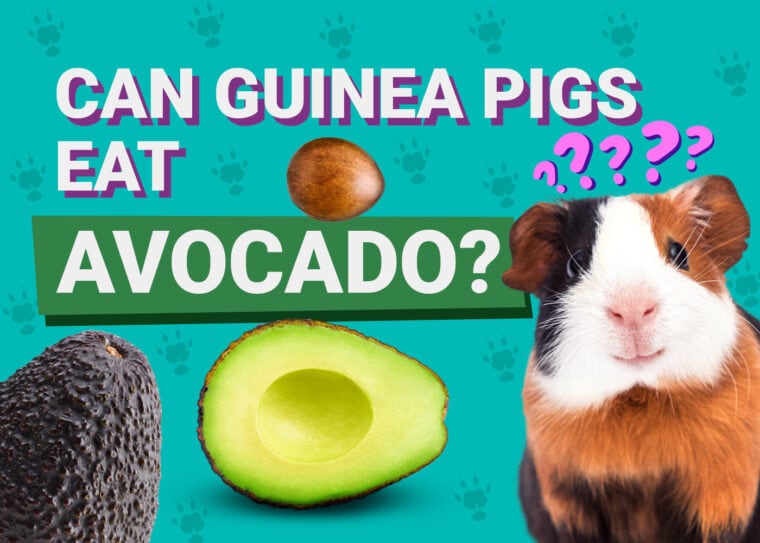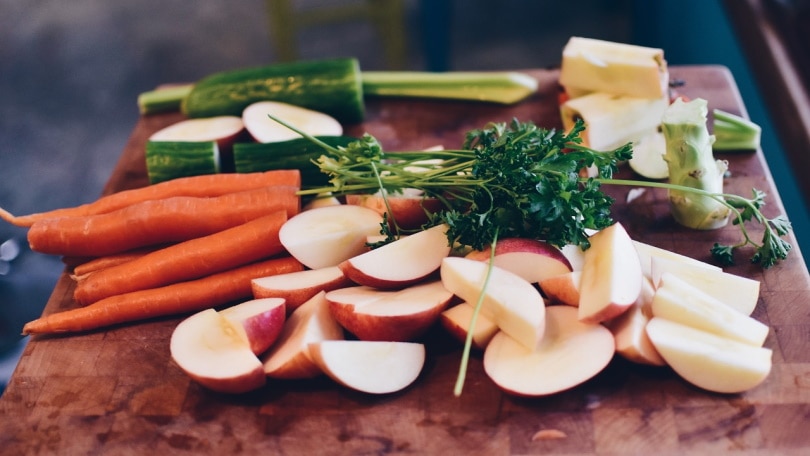
Every guinea pig owner knows that their furry family members love eating fruits and veggies as a supplement to their main diet of hay and grass-based pellets. But it can be tough to figure out which fruits and vegetables are actually safe to feed guinea pigs.
So, is it safe to feed avocado to your guinea pig? It is not! The toxicity of avocado is very variable, depending on the variant, genetic characteristics, growing process, and part of the fruit. It is impossible to predict it and it’s just not worth the risk for your guinea pig.
Thus, we recommend you keep avocado well away from your guinea pig, and we will explain why in more detail. Let’s get started!
The Problem with Avocado
A compound called persin that is present in the leaves, skin, seed, and flesh of the avocado in varying amounts has been found to be toxic to animals including guinea pigs. Ingesting this compound can cause problems such as diarrhea, myocardial necrosis, and even death. Avocados are also high in fat, which can create digestive and weight issues for your furry pal.
You may have read elsewhere or heard that ripe avocado flesh has very little persin in it, and you may wonder if that means it is safe. Unfortunately not! Currently, there just isn’t enough scientific evidence to say that it may be safely given to animals, including guinea pigs, so we prefer to be cautious and avoid it altogether. Risking a serious health issue in your guinea pig is just not worth it, as there are much better nutritional options for them.
What to Do if Your Guinea Pig Eats Avocado
If somehow your guinea pig got hold of any avocado, it is imperative that you contact your vet immediately. They may recommend that you bring your guinea pig in for a health check or monitoring to ensure no signs of toxicity develop. Digestive signs may be managed supportively, or your guinea pig may need to be admitted for fluid therapy, pain relief, and nutritional management. Unfortunately, in the case of heart damage, there may not be much that your vet can do. This stresses the importance of avoiding avocados around your furry little friend.
It may be that, depending on the avocado variant and persin content in the part of the fruit the guinea pig may have ingested, there won’t be any adverse effects whatsoever, but this is not guaranteed, and the risk is too high to justify. Research on this topic, especially in small furries, is very limited, and we have not found any reliable sources to state that avocado can be fed to guinea pigs. Reputable sources warn against avocado due to the risk of toxicity.
Alternative Options

There is no reason to even consider avocados, as there are many options when it comes to healthy and safe snacks for your guinea pig. There are many tasty fruits and vegetables that are perfectly healthy and safe for your pet. For example, guinea pigs love eating veggies like butterhead lettuce and carrot tops, but they also rely on leafy greens for their vitamin C intake. Fruits should be offered in small amounts only as occasional treats, as they are rich in sugar and water, and poor in fiber, and may lead to digestive upset, dental issues, and obesity. Here are a few fun snacking options to consider:
- Create a Superfood Salad. Finely chop kale, bell pepper, and a little bit of apple (without the seeds), and then toss the ingredients together with a little bit of asparagus or cilantro. Serve a small amount, as total daily vegetables should make up no more than 2 to 4 cups for every 6 pounds of weight, or a maximum of 10-15% of their daily food intake. Offer this superfood salad to your furry pal whenever they’re ready for a snack, but do not exceed this daily amount. This concoction of fresh greens and vegetables is their daily vitamin C dose, as guinea pigs do not make this vitamin on their own; they rely on getting it from their diet. Your guinea pig’s diet should consist of 85-90% hay and grass to maintain their gut and teeth health.
- Make a Morning Fruit Mix Every Once in a While. Use a little bit of a strawberry, a blueberry, and a wedge of banana for your guinea pig to enjoy while you’re having your own morning smoothie. But remember, offer a very small amount of fruit once or twice per week, and make sure not to overdo it. For reference, 1-2 blueberries per guinea pig is more than enough fruit at once.
- Share a Cucumber Mint Salad. Guinea pigs love cucumbers, and mint is safe for them to eat in small quantities. So, why not share that cucumber and mint salad you’re preparing for your own meal with them? Just be sure to put a little bit of the plain ingredients aside for your pet before sprucing it up with any seasoning, spices, or lemon juice.
For the best health results, guinea pigs’ diet should be based on hay and grass, with a small amount per day of greens and leafy vegetables providing their vitamin C requirements. The addition of vegetables and fruit should be done in moderation, as it may lead to health issues such as digestive upset and gut stasis, dental issues, and obesity. Guinea pigs should always eat fresh, raw fruits and vegetables. Avoid frozen and cooked options whenever possible.
Final Thoughts
Can guinea pigs eat avocado? Nope! Avocado is not safe for your guinea pig, and there is no reason to risk their health and well-being. We feel that there are plenty of other fruits and veggies guinea pigs can eat that are healthy and tasty and aren’t connected to any serious side effects to worry about.









